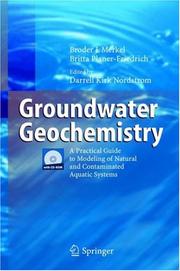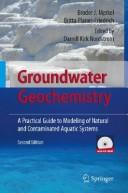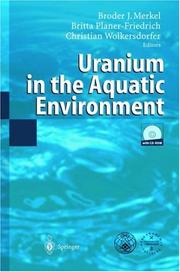| Listing 1 - 6 of 6 |
Sort by
|
Book
ISBN: 9783319110592 3319110586 9783319110585 1322138273 3319110594 Year: 2015 Publisher: Cham : Springer International Publishing : Imprint: Springer,
Abstract | Keywords | Export | Availability | Bookmark
 Loading...
Loading...Choose an application
- Reference Manager
- EndNote
- RefWorks (Direct export to RefWorks)
This book is the collection of papers from the latest International Uranium Mining and Hydrogeology Conference (UMH VII) held in September 2014, in Freiberg, Germany. It is divided to five sessions: Uranium Mining, Uranium and Phosphates, Clean-up technologies for water and soil. Uranium and daughter nuclides and basic research and modeling. Each session covers a wide range of related topic and provides readers with up to date research and solutions on those matters.
Earth Sciences. --- Mineral Resources. --- Effects of Radiation/Radiation Protection. --- Geotechnical Engineering & Applied Earth Sciences. --- Pollution, general. --- Geography. --- Mines and mineral resources. --- Environmental protection. --- Pollution. --- Géographie --- Mines et ressources minières --- Environnement --- Pollution --- Protection --- Hydrogeology -- Congresses. --- Uranium -- Congresses. --- Mechanical Engineering --- Engineering & Applied Sciences --- Mining Engineering --- Uranium --- International Conference on Uranium Mining and Hydrogeology --- Earth sciences. --- Mineral resources. --- Geotechnical engineering. --- Radiation protection. --- Radiation --- Safety measures. --- Actinide elements --- Metals --- Transuranium elements --- Chemical pollution --- Chemicals --- Contamination of environment --- Environmental pollution --- Contamination (Technology) --- Asbestos abatement --- Bioremediation --- Environmental engineering --- Environmental quality --- Factory and trade waste --- Hazardous waste site remediation --- Hazardous wastes --- In situ remediation --- Lead abatement --- Pollutants --- Refuse and refuse disposal --- Environmental quality management --- Protection of environment --- Environmental sciences --- Applied ecology --- Environmental policy --- Deposits, Mineral --- Mineral deposits --- Mineral resources --- Mines and mining --- Mining --- Natural resources --- Geology, Economic --- Minerals --- Environmental aspects --- Radiation—Safety measures. --- Engineering, Geotechnical --- Geotechnics --- Geotechnology --- Engineering geology --- Radiation monitoring --- Radiation protection

ISBN: 3540272216 3540241957 Year: 2005 Publisher: Berlin, Heidelberg : Springer Berlin Heidelberg : Imprint: Springer,
Abstract | Keywords | Export | Availability | Bookmark
 Loading...
Loading...Choose an application
- Reference Manager
- EndNote
- RefWorks (Direct export to RefWorks)
To understand hydrochemistry and to analyze natural as well as man-made impacts on aquatic systems, hydrogeochemical models have been used since the 1960’s and more frequently in recent times. Numerical groundwater flow, transport, and geochemical models are important tools besides classical deterministic and analytical approaches. Solving complex linear or non-linear systems of equations, commonly with hundreds of unknown parameters, is a routine task for a PC. Modeling hydrogeochemical processes requires a detailed and accurate water analysis, as well as thermodynamic and kinetic data as input. Thermodynamic data, such as complex formation constants and solubility products, are often provided as data sets within the respective programs. However, the description of surface-controlled reactions (sorption, cation exchange, surface complexation) and kinetically controlled reactions requires additional input data. Unlike groundwater flow and transport models, thermodynamic models, in principal, do not need any calibration. However, considering surface-controlled or kinetically controlled reaction models might be subject to calibration. Typical problems for the application of geochemical models are: speciation determination of saturation indices adjustment of equilibria/disequilibria for minerals or gases mixing of different waters modeling the effects of temperature stoichiometric reactions (e.g. titration) reactions with solids, fluids, and gaseous phases (in open and closed systems) sorption (cation exchange, surface complexation) inverse modeling kinetically controlled reactions reactive transport Hydrogeochemical models are dependent on the quality of the chemical analyses, the boundary conditions presumed by the program, theoretical concepts (e.g.
Water chemistry --- Mathematical models. --- Aquatic chemistry --- Chemical hydrology --- Hydrochemistry --- Hydrogeochemistry --- Natural water chemistry --- Geochemistry --- Hydrology --- Hydraulic engineering. --- Geology. --- Analytical biochemistry. --- Geography. --- Hydrogeology. --- Water Quality/Water Pollution. --- Analytical Chemistry. --- Geotechnical Engineering & Applied Earth Sciences. --- Earth Sciences, general. --- Cosmography --- Earth sciences --- World history --- Analytic biochemistry --- Biochemistry --- Chemistry, Analytic --- Geognosy --- Geoscience --- Natural history --- Engineering, Hydraulic --- Engineering --- Fluid mechanics --- Hydraulics --- Shore protection --- Bioanalytic chemistry --- Bioanalytical chemistry --- Analytical chemistry --- Water quality. --- Water pollution. --- Analytical chemistry. --- Geotechnical engineering. --- Earth sciences. --- Geosciences --- Environmental sciences --- Physical sciences --- Engineering, Geotechnical --- Geotechnics --- Geotechnology --- Engineering geology --- Analysis, Chemical --- Analytic chemistry --- Chemical analysis --- Chemistry --- Aquatic pollution --- Fresh water --- Fresh water pollution --- Freshwater pollution --- Inland water pollution --- Lake pollution --- Lakes --- Reservoirs --- River pollution --- Rivers --- Stream pollution --- Water contamination --- Water pollutants --- Water pollution --- Pollution --- Waste disposal in rivers, lakes, etc. --- Freshwater --- Freshwater quality --- Marine water quality --- Quality of water --- Seawater --- Seawater quality --- Water --- Environmental quality --- Geohydrology --- Geology --- Groundwater --- Quality --- Composition

ISBN: 3540746684 3540746676 9783540746676 9783540746683 Year: 2008 Publisher: Berlin, Heidelberg : Springer Berlin Heidelberg : Imprint: Springer,
Abstract | Keywords | Export | Availability | Bookmark
 Loading...
Loading...Choose an application
- Reference Manager
- EndNote
- RefWorks (Direct export to RefWorks)
To understand hydrochemistry and to analyze natural as well as man-made impacts on aquatic systems, hydrogeochemical models have been used since the 1960’s and more frequently in recent times. Numerical groundwater flow, transport, and geochemical models are important tools besides classical deterministic and analytical approaches. Solving complex linear or non-linear systems of equations, commonly with hundreds of unknown parameters, is a routine task for a PC. Modeling hydrogeochemical processes requires a detailed and accurate water analysis, as well as thermodynamic and kinetic data as input. Thermodynamic data, such as complex formation constants and solubility-products, are often provided as databases within the respective programs. However, the description of surface-controlled reactions (sorption, cation exchange, surface complexation) and kinetically controlled reactions requires additional input data. Unlike groundwater flow and transport models, thermodynamic models, in principal, do not need any calibration. However, considering surface-controlled or kinetically controlled reaction models might be subject to calibration. Typical problems for the application of geochemical models are: • speciation • determination of saturation indices • adjustment of equilibria/disequilibria for minerals or gases • mixing of different waters • modeling the effects of temperature • stoichiometric reactions (e.g. titration) • reactions with solids, fluids, and gaseous phases (in open and closed systems) • sorption (cation exchange, surface complexation) • inverse modeling • kinetically controlled reactions • reactive transport Hydrogeochemical models depend on the quality of the chemical analysis, the boundary conditions presumed by the program, theoretical concepts (e.g.
Water chemistry --- Mathematical models. --- Aquatic chemistry --- Chemical hydrology --- Hydrochemistry --- Hydrogeochemistry --- Natural water chemistry --- Geochemistry --- Hydrology --- Hydraulic engineering. --- Analytical biochemistry. --- Geography. --- Environmental toxicology. --- Hydrogeology. --- Hydrology/Water Resources. --- Analytical Chemistry. --- Geotechnical Engineering & Applied Earth Sciences. --- Earth Sciences, general. --- Ecotoxicology. --- Ecotoxicology --- Pollutants --- Pollution --- Environmental health --- Toxicology --- Cosmography --- Earth sciences --- World history --- Analytic biochemistry --- Biochemistry --- Chemistry, Analytic --- Engineering, Hydraulic --- Engineering --- Fluid mechanics --- Hydraulics --- Shore protection --- Bioanalytic chemistry --- Bioanalytical chemistry --- Analytical chemistry --- Hydrology. --- Analytical chemistry. --- Geotechnical engineering. --- Earth sciences. --- Geosciences --- Environmental sciences --- Physical sciences --- Engineering, Geotechnical --- Geotechnics --- Geotechnology --- Engineering geology --- Analysis, Chemical --- Analytic chemistry --- Chemical analysis --- Chemistry --- Aquatic sciences --- Hydrography --- Water --- Geohydrology --- Geology --- Groundwater --- Water chemistry - Mathematical models

ISBN: 3540439277 Year: 2002 Publisher: Berlin ; Heidelberg ; New York, NY : Springer-Verlag,
Abstract | Keywords | Export | Availability | Bookmark
 Loading...
Loading...Choose an application
- Reference Manager
- EndNote
- RefWorks (Direct export to RefWorks)
Book
Year: 2002 Publisher: Berlin ; Heidelberg : Springer,
Abstract | Keywords | Export | Availability | Bookmark
 Loading...
Loading...Choose an application
- Reference Manager
- EndNote
- RefWorks (Direct export to RefWorks)
Book
ISBN: 3030015726 3030015718 Year: 2019 Publisher: Cham : Springer International Publishing : Imprint: Springer,
Abstract | Keywords | Export | Availability | Bookmark
 Loading...
Loading...Choose an application
- Reference Manager
- EndNote
- RefWorks (Direct export to RefWorks)
This book comprises the selected papers from the 1st Springer Conference of the Arabian Journal of Geosciences (CAJG-1), Tunisia 2018. The volume is of interest to all researchers and practitioners in the fields of Hydrology, Hydrogeology, Hydrochemistry, Water Resources and Hydrologic Engineering. Water is a dynamic, finite, and vulnerable but resilient natural resource to be protected in an environmentally sustainable manner. Water systems in different frameworks requires a comprehensive understanding of climatology, geology, hydrogeology, hydrochemistry, hydrodynamics, and surface hydrology. In addition, it is highlighted the role of the variability and climate change in water systems. Furthermore, water has a vital significance to the entire socio-economic sector. This volume offers an overview of the state-of-the-art related to water science and technology in model regions in Europe, Africa, Middle East, Asia and America, but mainly focuses on the Mediterranean environment and surrounding regions. It gives new insights on characterisation, evaluation, quality, management, protection, modelling on environmental hydrology, groundwater, hydrochemistry, sustainable water resources studies and hydrologic engineering approaches by international researchers. Main topics include: 1. Hydrology, Climatology and Water-Related Ecosystems 2. Hydrochemistry and Isotopic Hydrology 3. Groundwater Assessment and Management: mapping, exploration, abstraction and modelling 4. Water Resources Sustainability and Climate Change 5. Hydrologic Engineering and Urban Groundwater.
Hydraulic engineering --- Environmental aspects --- Engineering, Hydraulic --- Engineering --- Fluid mechanics --- Hydraulics --- Shore protection --- Geography. --- Climatic changes. --- Earth Sciences, general. --- Hydrology/Water Resources. --- Climate Change. --- Changes, Climatic --- Changes in climate --- Climate change --- Climate change science --- Climate changes --- Climate variations --- Climatic change --- Climatic changes --- Climatic fluctuations --- Climatic variations --- Global climate changes --- Global climatic changes --- Climatology --- Climate change mitigation --- Teleconnections (Climatology) --- Cosmography --- Earth sciences --- World history --- Earth sciences. --- Hydrology. --- Climate change. --- Aquatic sciences --- Hydrography --- Water --- Geosciences --- Environmental sciences --- Physical sciences --- Global environmental change --- Water. --- Environment. --- Earth Sciences. --- Environmental Sciences. --- Balance of nature --- Biology --- Bionomics --- Ecological processes --- Ecological science --- Ecological sciences --- Environment --- Environmental biology --- Oecology --- Population biology --- Hydrology --- Ecology
| Listing 1 - 6 of 6 |
Sort by
|

 Search
Search Feedback
Feedback About
About Help
Help News
News